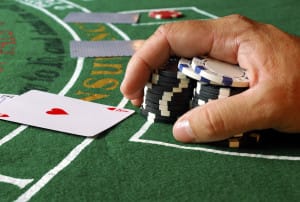Often overlooked in the pantheon of addictions, gambling dependency can destroy hopes, dreams and lives as thoroughly, quickly and efficiently as any other type of addiction. But as potent as it is when acting alone, gambling addiction is even more destructive when accompanied by other addictions and disorders—which it almost always is. Pathological gambling will empty checking accounts, savings accounts and wallets while maxing out credit cards and putting mortgages at constant risk of foreclosure. These financial problems are minor, however, in comparison to the damage out-of-control gambling can do to the minds and bodies of the people it infects. The voids pathological gamblers create in their own lives are usually filled by other ruinous health conditions, compounding the troubles these beleaguered souls must struggle to overcome. From 2001 through 2005, the National Institute on Alcohol Abuse and Alcoholism (NIAAA) sponsored a massive fact-finding research project called the National Epidemiologic Survey on Alcohol and Related Conditions (NESARC). The amount of data NIAAA researchers collected was immense and gave mental health and addiction specialists a unique opportunity to explore the relationships that exist between various common mental health and behavioral disorders. Obviously this study wasn’t designed specifically to unearth secrets about problem gambling, but that’s exactly what it did.
Gambling Addiction and Substance Abuse
With almost any psychological, emotional or behavioral disorder, there will be an increased incidence of various co-occurring illnesses. But the connection between gambling addiction and substance abuse runs unusually deep. According to NESARC statistics, an astonishing 73 percent of gambling addicts are also problem drinkers, while 38 percent registered positive for a drug abuse disorder. Smoking is also ridiculously common among pathological gamblers, as 60 percent are practicing nicotine addicts. These rates are all far above the norm, so it is clear this is more than a statistical coincidence. Addictions like these emerge as self-control is lost. As inhibitions are gradually lowered, formerly voluntary behavior becomes physically and emotionally compulsive, and the alcoholic or drug addict soon loses touch with reality and plunges into a downward spiral. While there is no physical dependency involved, gambling addiction follows the same arc of development as substance abuse conditions, and in each case the process of recovery will be long and arduous. When exploring the connection between pathological gambling and drug or alcohol addiction, it is not particularly sensible to talk of a cause-and-effect relationship. Gambling culture is closely associated with excessive drinking and has been for a long time, so it is hardly surprising to discover that illicit drug use is mixing easily with heavy gambling activity as well. Additionally, alcohol and drugs affect judgment and predispose a person to rash and impulsive behavior, so it is not hard to see why those with a history of substance abuse might fall victim to gambling’s seductive lure. Causes and effects in this relationship are hopelessly entangled. This is why alcoholic or drug-addicted pathological gamblers will absolutely need to seek treatment for each of their disorders if they expect to make a full recovery.
Gambling Addiction and Mental Illness
People with serious gambling problems frequently have underlying mental illnesses. At the same time, heavy gamblers ride such an emotional roller coaster and are forced to face so many traumatic consequences that mental and emotional decline and breakdown may be all but inevitable beyond a certain point. So again, cause and effect are strongly intertwined when gambling addiction and mental health issues are involved, and each will obviously make recovery from the other all that much more difficult. More than 60 percent of pathological gamblers suffer from a personality disorder. This is not the type of condition that would develop in response to a gambling addiction, but a personality disorder could very well hinder a person’s ability to control his or her gambling behavior. On the other hand, 50 percent of pathological gamblers have suffered from a mood disorder (usually depression) and 41 percent from an anxiety disorder at some point in their lives, and these are exactly the kind of mental health problems that might arise in an individual whose life has been turned upside down by a serious gambling condition.
Gambling Addiction and Criminality
This subject was not covered in the NESARC study from which the previously-mentioned statistics were taken. But according to other reports, fully one-third of the U.S. prison population meets the criteria for gambling addiction, which is 10 to 20 times the rate among the general public. And about half of these men and women claim the crimes they were incarcerated for were directly related to their gambling behavior, contradicting the popular assertion that gambling is a victimless crime. Gambling addiction is a complex, multifaceted phenomenon, and few pathological gamblers are inflicted with a single solitary medical condition they need to overcome in order to resume a normal life. There is almost always more going on than just out-of-control gambling, and every treatment professional who works with gambling addicts will need to customize his or her rehabilitation plans to make sure each patient gets the necessary comprehensive treatment.



